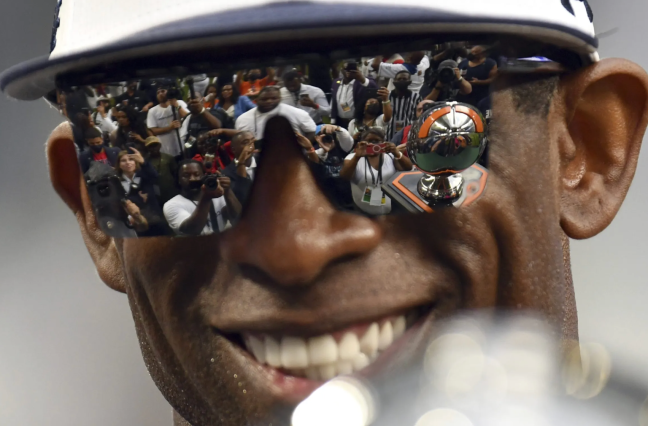The debate surrounding the Jackson State University (JSU)-Deion Sanders situation has been polarizing to say the least. But I understand the outrage. On the surface, this seems like another tale of a Black person seeking green grass on the PWI (Predominantly White Institution) lawn. But there’s more to the iceberg.
Deion Sanders is a beloved sports figure, as both a professional football and baseball player and most recently, as the coach of the unstoppable force that is JSU football. During his stint, JSU won back to back SWAC (Southwestern Atlantic Conference) championships, had a 27-5 record, and media coverage by ESPN College Gameday (which is unprecedented for HBCU football teams). It’s on record Sanders has donated large sums of his salary and established notable brand partnerships to raise the profile of JSU’s team and facilities.
But despite his success at JSU, Sanders had one foot out the door in case a Power 5 [which is composed of the Atlantic Coast Conference (ACC), Big Ten Conference, Big 12 Conference, Pac-12 Conference, and Southeastern Conference (SEC)] offer came to his doorstep.
After an abysmal 2021-22 season, Colorado came knocking at his door and implored him to take the helm as its new head football coach. He accepted the offer. Then the fireworks began.
Those in support of Sanders’ decision argued:
- People are allowed to change their minds, right?
- Why are we putting this weight on him in the first place? Is it his sole responsibility to keep the limelight on and raise the profile of HBCU sports?
- Where is this energy for white coaches who have done the same thing? Why is there always a crab-in-the-barrel response toward Black folks who seek and gain opportunities at PWIs?
- Sanders donated more than half of his salary to fund JSU’s struggling facilities and services and he’s led various philanthropic efforts to help the Jackson community—one of America’s poorest cities that’s recently been plagued with clean water disparity and economically bruised by several corrupt negotiations (yes, we’re talking about you, Brett Favre).
- Why can’t he just do what’s best for him and his family?
All very valid points.
But those in opposition have legs to stand on as well:
- Why is he using the God ploy to avoid accountability namely when:
- He refused to pay a mechanic in full for the work he did on his convertible in the early 2000s because “Jesus had informed him that was all he needed to pay”
- He and the JSU coaching staff denied a Clarion-Ledger (a Jackson, MS-based newspaper) reporter access at a SWAC media day because of a story he wrote on a JSU top recruit who allegedly sexually assaulted a woman.
- Why did he sell dreams to his players and families that choosing his HBCU over a PWI could spark foundational ripples across HBCU football…if he only planned to have a short tenure at said HBCU?
Sanders’ (a.k.a. Coach Prime) tenure felt like a flash in the pan. Not the gumbo approach necessary to foster a sustained culture of funneling top national recruits into HBCUs instead of Power 5s. This takes much longer than three years. And yes, as the JSU coach, Sanders was technically only responsible for JSU. But he couldn’t separate the fact he was supernova within the HBCU football community. He couldn’t just be JSU’s coach. He had the responsibility to uphold his promises of contributing to the talent pipeline.
But to be fair, HBCUs have their problems and Sanders faced his fair share at JSU. There was disparity and dilapidation everywhere he looked. Facing these challenges day-in-and-day-out can even wear out the most patient and graceful.
It’s possible Coach Prime was sick and tired of it all and didn’t want to have so many obstacles to do his job to the best of his ability. Because if he was able to achieve the unprecedented success he had at JSU all things considered, in theory, he should achieve far more at a Power 5 school that doesn’t have the same off-the-field challenges. But we are left pondering on what could have been if he persevered to carry out his calling to help raise the profile of not just HBCU football, but HBCU sports as a whole.
Sanders’ (a.k.a. Coach Prime) tenure felt like a flash in the pan. Not the gumbo approach necessary to foster a sustained culture of funneling top national recruits into HBCUs instead of Power 5s.
Coach Prime has already expressed he’s bringing his sons and his cream of the crop JSU players with him to Colorado. So what does that mean for the other recruits he implored to stay with him? They’re forced to make two difficult decisions: to stay at JSU and let the cards fall where they may or to enter the transfer portal. The perception is Coach Prime gambled with his players’ futures. He gambled with their draft stocks, their and their family’s futures, and opportunity to make it to the NFL. [I’m aware not every single JSU player has the talent to make it to the pros (and some may not even want to.)] Yes, Power 5 football has a larger talent pool than HBCU football, which makes it difficult to stand out. But it’s even harder for HBCUs to break through to the next level because of the lack of national exposure. In the last five years alone, there have only been 12 HBCU football players drafted into the NFL.
Because of his legendary pro career and successful coaching career thus far, he manifests his destiny. In his three years as a coach, he hasn’t experienced failure. It remains to be seen how he’ll handle the tougher Power 5 arena. Coach Prime should be provided the grace to experience failure. But he won’t because we can’t. Black coaches have to fight tooth and nail to rise through the ranks to get coveted head coaching positions (Sanders getting the JSU head coaching job without prior collegiate coaching experience was a unicorn situation). When Black coaches finally get there, they have shorter leashes for failure in comparison to their white counterparts. This isn’t a bold claim—look it up for yourself. The adage rings true: we have to be twice as good to get half of what they get.
Sanders was exceptional at JSU, but if he doesn’t have the same immediate success at Colorado from the onset, I fear he’ll be on the road to the chopping block.
But it seems as the national conversation surrounding Black equity has faded, so has Coach Prime’s mission to uplift HBCU football.
Virtually everybody is exceptional on the Power 5 stage. This isn’t to say HBCU teams aren’t talented. But there is a massive disparity in the amount of four- and five-star recruits playing in the Power 5 versus HBCUs. Coach Prime now has the hottest seat in college football. The limelight will beat down on his back each and every day for years to come. I pray it doesn’t scorch him in the process.
Sanders is the lightning rod in this debate. But once the dust settles with this Sanders-JSU story, America won’t care anymore. This will just be another blip in the news cycle. Black lives and institutions don’t matter in America’s eyes.
Just look at the aftermath of the 2020 uprisings. Lofty, reactive DEI (Diversity, Equity, Inclusion) initiatives and media coverage have dried up. And a handful of top Black civil rights leaders that’ve been caught red handed for misappropriating funds or worse. We took two steps forward just to go back three.
Sanders came on as JSU’s coach in September 2020, which he said was both a career opportunity and a form of activism. But it seems as the national conversation surrounding Black equity has faded, so has Coach Prime’s mission to uplift HBCU football. It feels like he’s abandoning the fight to take the easier route at a PWI.
Sanders, however, is torn up by his decision because he realizes he has forced his players to make difficult decisions that will impact their respective football futures. At the same time, Sanders has every right to do what’s best for him and his family. Several of his players even support his decision to go to Colorado.
I want the best for this Black superhero. But I hope Coach Prime doesn’t become the villain if he fails at Colorado. I hope JSU is able to build off Coach’s success and continues to be a beacon for HBCU football. The pressure on both Coach Prime and JSU to continue to succeed is greater than ever. I hope the pressure makes diamonds.


